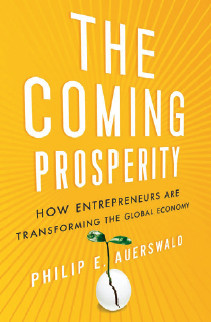
The Coming Prosperity: How Entrepreneurs Are Transforming the Global Economy
Philip Auerswald
280 pages, Oxford University Press, 2012
The One Laptop per Child (OLPC) project has provided one thing of value to international development: a handy litmus test for whether someone should be taken seriously. As Peter Diamandis and Steven Kotler, authors of Abundance, praise OLPC, despite a complete lack of evidence of positive impact, it is quickly obvious what to expect from the book.
Abundance is techno-utopianism at its worst. The outlook of the book can be summed up by a discussion of the advent of 3-D printers—machines that can form three-dimensional objects much as an inkjet printer forms words. Soon, the authors suggest, “everyone” will have one of these amazing machines. They approvingly quote an innovator of 3-D printing technology: “And once that happens it will change everything. … Instead of placing an order and waiting 24 hours for your FedEx package, just hit print and get it in minutes.” Although you may be wondering how solving a 1 percent problem will change the world of the billions of people without easy access to electricity, clearly the authors aren’t.
Why? Because no matter what the symptom, the authors see a technological Band-Aid. They describe a future in which something like Google is directly connected to our brains so that when we think of something we don’t know, the answers are instantly supplied to us. Clearly this technology innovation is not working yet, as the authors didn’t automagically learn that they have devastatingly mistaken symptoms for problems. In the few places where they begin to acknowledge that the problems that keep much of the world disenfranchised, impoverished, and unhealthy are not technological in origin, they quickly explain that we already “know” how to deal with those issues. For instance, we “know” that “community support is the most critical component for any water solution” and “maintenance workers need to be incentivized.” Now that we know these facts, a technology breakthrough is all that’s needed to fix global water problems. I wonder what technology will fi x global justice problems now that we know all people are created equal.
Abundance is meant to be an optimistic antidote to the world’s doomsayers, but it left me deeply depressed. If bright and innovative minds are still completely captured by technological fixes to social problems, we have much further to go in solving those problems than I believed.
After throwing Abundance across the room, I found Philip Auerswald’s The Coming Prosperity a breath of fresh air. Auerswald’s focus is on human beings and the way they solve problems. Technology matters only insofar as it enables the people solving their own problems to outpace the people creating them.
Auerswald’s term for people who solve problems is a familiar and dear one to readers of this magazine: entrepreneur. His main concern is that entrepreneurs, a term he uses quite expansively, are not receiving enough attention from policymakers, economists, political scientists, and philanthropists. These groups all come in for criticism for their habits of patting entrepreneurs on the head before getting back to the serious business of picking winners and driving policy from the top down.
Ultimately though, he argues, this habit is irrelevant. The world’s entrepreneurs are now numerous enough, free enough, and, yes, have access to sufficient technology, to innovate and succeed in spite of the powers that be. Auerswald writes not to convince the powerful and influential at the top of the pyramid to change as much as to inform them that they are no longer relevant—and that’s good news for everyone.
This is a message that needs to be delivered. Unfortunately, The Coming Prosperity doesn’t do the best job of delivering it. The book wavers between popular and academic modes, between personal anecdote and global sweep, between explaining the deficiencies of current elites and telling them they don’t matter. As a result, chapters tend to ramble and it’s easy to lose the plot. The best way to read the book is probably to read the last page of each chapter first. Then you’ll be in a better position to appreciate the many interesting anecdotes and data.
Despite its weaknesses in execution, Auerswald’s fundamentally humble message is both cheering and worth hearing. You and I don’t have the answers to the world’s problems, and we don’t need to. There are now enough smart people in every corner of the world with access to the ideas, tools, and resources necessary to ensure the coming of a new and truly global prosperity no matter what the 1 percent or anyone else does. I’m a skeptic by nature and by no means convinced by Auerswald, but I’m more hopeful than I was before picking up the book. Maybe the failures of Abundance’s authors to appreciate what it truly takes to solve problems simply don’t matter after all.

